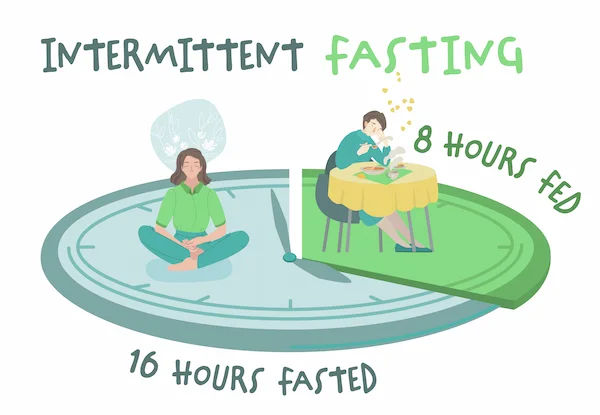Intermittent Fasting: A Beginner's Guide to Schedules & Benefits
New to intermittent fasting? Discover popular fasting schedules, key health benefits, and practical tips to get started safely. Your complete beginner’s guide to a healthier lifestyle through smart fasting.

Written by Dr. M L Ezhilarasan
Reviewed by Dr. Rohinipriyanka Pondugula MBBS
Last updated on 23rd Sep, 2025

Intermittent fasting has surged in popularity, moving from a niche biohacking trend to a mainstream health strategy. But what exactly is it? Unlike traditional diets that focus solely on what you eat, intermittent fasting (IF) is all about when you eat. It’s an eating pattern that cycles between periods of fasting and eating. It doesn’t prescribe specific foods but rather designates time windows for consumption. This approach isn't about starvation; it's about working with your body's natural rhythms to unlock a host of potential health benefits, from weight loss and improved metabolism to enhanced brain function. This comprehensive guide will demystify intermittent fasting, explore the science behind it, outline the most popular methods, and provide you with a practical roadmap to get started safely and effectively.
What is Intermittent Fasting?
At its core, intermittent fasting is an eating pattern, not a diet in the conventional sense. It doesn’t eliminate food groups or mandate calorie counting (though calories still matter for weight loss). Instead, it structures your day or week to include periods where you abstain from caloric intake, allowing your body to tap into energy stores it doesn't access during constant feeding.
The Core Principle: Cycling Between Eating and Fasting
The fundamental idea is to extend the natural fasting period everyone experiences overnight. While you sleep, your body isn't receiving food. Intermittent fasting intentionally lengthens this period. This extended fast allows insulin levels to drop significantly, signaling the body to start burning stored fat for energy—a process that is the cornerstone of many of IF's benefits.
Intermittent Fasting vs. Calorie Restriction: What's the Difference?
This is a crucial distinction. Continuous calorie restriction often leads to a slowed metabolism as the body adapts to lower energy intake—a common plateau for dieters. IF, on the other hand, may primarily work by hormonal manipulation. By creating a defined fasting window, it enhances hormone function to facilitate weight loss. For example, lower insulin levels and increased norepinephrine make stored body fat more accessible for energy. This means you can potentially lose weight without constantly feeling hungry or sacrificing your metabolic rate, as the body isn't in a perpetual state of energy conservation.
The Science Behind the Fast: How It Rewires Your Body
When you stop eating for an extended period, your body initiates several important cellular and molecular processes. Understanding this science helps explain why intermittent fasting is more than just skipping meals.
Insulin Sensitivity and Fat Burning
Insulin is a hormone that allows cells to take in glucose from your blood for energy. When you eat frequently, especially carbohydrates, your insulin levels remain high. High insulin tells your body to store fat and blocks fat burning. During a fast, insulin levels drop dramatically. This drop is the key signal for your body to start breaking down stored fat into fatty acids, which are then used for energy. Improved insulin sensitivity is one of the most well-documented benefits, reducing the risk of type 2 diabetes.
The Magic of Autophagy: Cellular Housekeeping
This is a fascinating benefit unique to fasting. Autophagy (from the Greek for "self-eating") is the body’s innate process of cleaning out damaged cells and regenerating new, healthy ones. Think of it as internal cellular housekeeping. During a fast, as energy is scarce, your body ramps up autophagy to recycle old, dysfunctional cellular components and proteins. This process is crucial for preventing diseases like cancer and Alzheimer's and is a primary driver behind the anti-aging claims associated with IF. Nobel Prize-winning research in 2016 brought this process into the scientific spotlight.
Human Growth Hormone (HGH) and Metabolic Switch
Studies have shown that fasting can cause a dramatic increase in human growth hormone (HGH) secretion—as much as 5-fold. HGH is a vital hormone for fat metabolism, muscle gain, and overall health. Furthermore, after 12+ hours of fasting, your body depletes its sugar stores (glycogen) and begins to rely more on fat-derived ketones for energy. This "metabolic switch" from sugar-burner to fat-burner is associated with improved mental clarity, energy stability, and physical endurance.
Popular Intermittent Fasting Methods: Finding Your Fit
There is no one-size-fits-all approach to intermittent fasting. The best method is the one you can consistently adhere to. Here are the most popular protocols:
The 16/8 Method (Leangains Protocol)
This is the most popular and beginner-friendly approach. It involves fasting every day for 14-16 hours and restricting your daily "eating window" to 8-10 hours. For most people, this simply means skipping breakfast and having your first meal around noon and your last meal by 8 PM. You can consume water, black coffee, and other zero-calorie beverages during the fast, which makes it very manageable.
The 5:2 Diet (The Fast Diet)
This method involves eating normally for five days of the week while restricting your calorie intake to 500-600 calories on the other two, non-consecutive days. For example, you might eat normally every day except Mondays and Thursdays, where you have two small meals of 250-300 calories each.
Eat-Stop-Eat (24-Hour Fast)
This involves doing a full 24-hour fast once or twice a week. For example, you might finish dinner at 7 PM on Tuesday and not eat again until 7 PM on Wednesday. This can be more challenging for beginners due to potential hunger and fatigue, but many find it effective.
Alternate-Day Fasting
As the name implies, this pattern alternates between days of normal eating and days of fasting (either complete fasting or a very low-calorie intake of around 500 calories). This is a more advanced protocol and is not generally recommended for long-term use without medical supervision.
Top Evidence-Based Benefits of Intermittent Fasting
The potential benefits of IF extend far beyond the number on the scale, supported by a growing body of research.
Sustainable Weight Loss and Belly Fat Reduction
By enhancing hormone function to facilitate fat burning and often leading to a natural reduction in calorie intake, IF is a powerful tool for weight loss. Studies show it can cause 3-8% weight loss over 3-24 weeks, a significant amount. Notably, it particularly targets harmful visceral belly fat, which is linked to metabolic disease.
Improved Brain Health and Cognitive Function
Fasting is a form of mild stress that benefits the brain. It boosts the production of a protein called brain-derived neurotrophic factor (BDNF). Low levels of BDNF are linked to depression and various brain diseases. Animal studies also suggest that IF may aid in the growth of new nerve cells and protect the brain from damage.
Consult Top Specialists
Enhanced Cellular Repair and Longevity
As discussed, the process of autophagy is dramatically increased during fasting. By clearing out cellular debris and promoting regeneration, IF may slow down the aging process and protect against age-related illnesses. Studies in rodents have shown that intermittent fasting can extend lifespan in similar ways to continuous calorie restriction.
Potential Benefits for Heart Health and Blood Sugar
IF has been shown to improve numerous risk factors for heart disease, including blood pressure, cholesterol levels, triglycerides, and inflammatory markers. Its powerful effect on insulin resistance also leads to a reduction in blood sugar levels, which is a key factor in managing and preventing type 2 diabetes.
How to Start Intermittent Fasting Safely and Effectively?
Jumping in too fast is a common mistake. Here’s how to begin your intermittent fasting journey intelligently.
Choosing the Right Fasting Window for Your Lifestyle
Start simple. The 16/8 method is often the easiest to integrate. If 16 hours seems daunting, begin with a 14-hour fast. Listen to your body. A desk worker might find a noon-8 PM window perfect, while a construction worker might need an earlier eating window to fuel their activity. The key is consistency.
What to Break a Fast With and What to Eat in Your Window
While IF isn't a diet, you can't break a fast with a sugar-laden meal and expect optimal results. Break your fast with a balanced meal containing protein, healthy fats, and complex carbohydrates. Think a chicken salad with avocado, a smoothie with protein powder and spinach, or eggs with whole-grain toast. During your eating window, focus on whole, unprocessed foods to nourish your body and stay satiated.
Managing Hunger Pangs and Initial Side Effects
It’s normal to feel hungry or irritable when you first start. This usually subsides as your body adapts. Stay hydrated—drink plenty of water, herbal tea, or black coffee. A pinch of salt in your water can help with electrolytes. Keep busy to distract yourself from thoughts of food. If your hunger is accompanied by dizziness, nausea, or extreme fatigue, you may need to shorten your fast or consult a doctor online with Apollo24|7 to rule out underlying issues.
Common Intermittent Fasting Mistakes to Avoid
- Overeating during your eating window: IF is not a license to binge. You still need to maintain a caloric deficit for weight loss.
- Starting too aggressively: A 24-hour fast on day one will lead to misery and burnout. Ease into it.
- Not drinking enough water: Dehydration is a common cause of headaches and fatigue during a fast.
- Ignoring your body's signals: Some fatigue is normal; feeling faint is not. Adjust your approach as needed.
- Eating the wrong foods: Breaking a fast with processed carbs will spike your insulin and leave you hungry and tired quickly.
Who Should Avoid Intermittent Fasting?
IF is not for everyone. The following groups should avoid it or only attempt it under strict medical supervision:
- Pregnant or breastfeeding women
- Individuals with a history of eating disorders
- Those who are underweight or have nutrient deficiencies
- People with diabetes or blood sugar regulation problems (It can be done but requires careful monitoring and professional guidance. Apollo 24|7 offers convenient home collection for testslike HbA1c to help monitor your levels.)
- Individuals on medication that requires food intake
If you have any chronic health conditions, it is imperative to consult a doctor online with Apollo 24|7 before embarking on an intermittent fasting plan.
Conclusion
Intermittent fasting offers a paradigm shift from traditional dieting, focusing on meal timing to harness the body's innate healing and metabolic processes. From promoting sustainable weight loss and boosting brainpower to encouraging cellular cleanup, the potential benefits are profound and backed by evolving science. However, it's not a magic bullet. Success hinges on a mindful approach—choosing a sustainable method, eating nutritious foods during your window, and, most importantly, listening to your body's signals. It's a powerful tool for taking control of your health, but it must be used wisely. If you have any doubts about whether this approach is right for you, especially with pre-existing conditions, a quick consultation with a healthcare professional can provide personalized guidance and ensure your journey is both effective and safe.
Consult Top Specialists
Consult Top Specialists

Ms. Sushma Jaiswal
Dietician
42 Years • M.Sc.(Food & Nutrition)
Bengaluru
Swasthya Nutrition, Bengaluru

Ms Malabika Datta
Dietician
19 Years • Bsc (Clinical Nutrition & Dietetics), Msc (Dietetics & Food Service Management)
Kolkata
Malabika’s Diet Clinic, Kolkata

Ms. Neelanjana J
Dietician
5 Years • Bsc., Msc. Nutrition and Dietetics specialised general weight management, PCOS/PCOD weight loss and Diabetes management. A clinical dietitian with 4+ year experience specializing in evidence-based, result-oriented nutrition therapy. I have extensive experience in weight loss, thyroid management, PCOD/PCOS, weight gain, and diabetes & prediabetes care. My approach is personalized, practical, and sustainable—focusing on helping individuals achieve long-term lifestyle change rather than quick fixes. I work closely with clients to understand their medical history, lifestyle, and goals, and then design customized diet plans that support hormonal balance, metabolic health, and overall wellbeing. My goal is to make nutrition simple, realistic, and effective—so you see measurable results and feel your healthiest self.Auther in Health benefits of jackfruit (Artocarpus heterophyllus Lam.) seeds: A review (2023) The Pharma Innovation Journal Co- Auther in Malnutrition in Women: A review (2023) The Pharma Innovation Journal. Highfield Level 3 in HACCP. Highfield Level 4 International Award in Food Safety Managment
Bengaluru
Apollo Clinic, JP nagar, Bengaluru

Dr Darshana R
General Physician/ Internal Medicine Specialist
15 Years • MBBS, MD, DNB (Internal Medicine), Diploma in Allergy, Asthma and Immunology , Fellowship in Diabetes
Bengaluru
Apollo Clinic, JP nagar, Bengaluru
(125+ Patients)
Ms Chetu Singhi
Dietician
20 Years • MSC Dietetics & Nutrition
Kolkata
RB Diagnostic - Dietician Diet2fit Chetu Singhi, Kolkata
Consult Top Specialists

Ms. Sushma Jaiswal
Dietician
42 Years • M.Sc.(Food & Nutrition)
Bengaluru
Swasthya Nutrition, Bengaluru

Ms Malabika Datta
Dietician
19 Years • Bsc (Clinical Nutrition & Dietetics), Msc (Dietetics & Food Service Management)
Kolkata
Malabika’s Diet Clinic, Kolkata

Ms. Neelanjana J
Dietician
5 Years • Bsc., Msc. Nutrition and Dietetics specialised general weight management, PCOS/PCOD weight loss and Diabetes management. A clinical dietitian with 4+ year experience specializing in evidence-based, result-oriented nutrition therapy. I have extensive experience in weight loss, thyroid management, PCOD/PCOS, weight gain, and diabetes & prediabetes care. My approach is personalized, practical, and sustainable—focusing on helping individuals achieve long-term lifestyle change rather than quick fixes. I work closely with clients to understand their medical history, lifestyle, and goals, and then design customized diet plans that support hormonal balance, metabolic health, and overall wellbeing. My goal is to make nutrition simple, realistic, and effective—so you see measurable results and feel your healthiest self.Auther in Health benefits of jackfruit (Artocarpus heterophyllus Lam.) seeds: A review (2023) The Pharma Innovation Journal Co- Auther in Malnutrition in Women: A review (2023) The Pharma Innovation Journal. Highfield Level 3 in HACCP. Highfield Level 4 International Award in Food Safety Managment
Bengaluru
Apollo Clinic, JP nagar, Bengaluru

Dr Darshana R
General Physician/ Internal Medicine Specialist
15 Years • MBBS, MD, DNB (Internal Medicine), Diploma in Allergy, Asthma and Immunology , Fellowship in Diabetes
Bengaluru
Apollo Clinic, JP nagar, Bengaluru
(125+ Patients)
Ms Chetu Singhi
Dietician
20 Years • MSC Dietetics & Nutrition
Kolkata
RB Diagnostic - Dietician Diet2fit Chetu Singhi, Kolkata
More articles from Weight Loss Non Surgical
Frequently Asked Questions
Can I drink anything during the fasting window?
Yes, you can and should drink zero-calorie beverages to stay hydrated. This includes water, black coffee, and unsweetened tea. Avoid anything with sugar, cream, or milk, as calories will break your fast.
Won't I lose muscle mass while fasting?
Some studies suggest that intermittent fasting may be better for preserving muscle mass than standard calorie restriction. The increase in growth hormone during a fast helps protect muscle. Ensuring you consume adequate protein during your eating window is also crucial for muscle maintenance.
How long does it take to see results from intermittent fasting?
This varies by individual and your goals. Some people feel increased energy and reduced bloating within the first week. Noticeable weight loss results from a 16/8 protocol typically become evident after 2-4 weeks of consistent practice.
Is intermittent fasting safe for women?
Some evidence suggests women may be more sensitive to signals of starvation than men, potentially affecting hormones. Many women do well with IF, but others may experience disrupted menstrual cycles. It's advised that women start with a more gentle approach, like a 14-hour fast, and pay close attention to their body's signals. Consulting a healthcare provider is recommended.
What is the best intermittent fasting schedule for beginners?
The 16/8 method is widely considered the best intermittent fasting for beginners. It's sustainable, easy to follow, and simply involves delaying your first meal of the day. You can adjust the fasting window to 14:10 if 16 hours feels too challenging initially.

